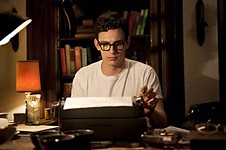The Celluloid Closet
1995, NR, 102 min. Directed by Rob Epstein, Jeffrey Friedman. Narrated by Lily Tomlin. Starring Harvey Fierstein, Whoopi Goldberg, Tom Hanks, Antonio Banderas, Farley Granger.
REVIEWED By Marjorie Baumgarten, Fri., April 26, 1996
In 1981, Vito Russo's landmark book, The Celluloid Closet, exposed the truth about the widely held belief that images of gays and lesbians were absent in Hollywood movies. His book, which was updated and reissued in 1987, catalogued the depiction of gay and lesbian characters in popular movies with such comprehensive cultural, historic, and aesthetic scope that these images would remain “outed” forever after. Russo's interest was not the exposure of individuals -- who was or wasn't, may have been, should have been, could have been homosexual. What Russo exposed were the images themselves -- the codification of stereotypes, the visual and verbal cues, the marginalization, the censorial structure of the Hollywood Production Code ushered in during the 1930s, androgynous gender-bending, and more. The book documented images dating as far back as an old Edison film of two men dancing together in the laboratory and added a new chapter about images in the 1980s for the updated edition. Although the images were rarely positive or choice-affirming, Russo did clearly establish their presence and the forms they took. Now, 15 years after it was first published, The Celluloid Closet has been deftly translated for the screen by two award-winning filmmakers, Rob Epstein and Jeffrey Friedman (The Times of Harvey Milk, Common Threads: Stories from the Quilt). Russo died in 1990 from AIDS complications, thus the film's narration is written by Armistead Maupin and read by Lily Tomlin. The filmmakers have gathered together a staggering array of the moving images that the book could only show in still form or verbal description. In the process, the movie provides a quite compact study in film history. The film clips are interspersed with insightful testimonies from numerous film observers and participants, including Maupin, Susie Bright, Gore Vidal, Paul Rudnick, Tom Hanks, Tony Curtis, Whoopi Goldberg, Jan Oxenberg, Quentin Crisp, Mart Crowley, Susan Sarandon, and many others. Sometimes their stories are priceless, especially when combined with the illustrative film clips. Yet, often, the testimony becomes repetitive and leans too heavily on the one-way effect that the movies' closeted imagery had on their personal development without also examining how movies provide a cultural mirror that reflects society in return. Neither does the movie delve into the recent explosion in independent filmmaking in which gay and lesbian lifestyles have found greater representation and voice. Still, faulting The Celluloid Closet for what it does not include very much misses the point: visible access to the closet and not just trying everything on.
A note to readers: Bold and uncensored, The Austin Chronicle has been Austin’s independent news source for over 40 years, expressing the community’s political and environmental concerns and supporting its active cultural scene. Now more than ever, we need your support to continue supplying Austin with independent, free press. If real news is important to you, please consider making a donation of $5, $10 or whatever you can afford, to help keep our journalism on stands.
Marjorie Baumgarten, Sept. 13, 2019
Marjorie Baumgarten, Nov. 12, 2010
March 15, 2025
March 14, 2025
The Celluloid Closet, Rob Epstein, Jeffrey Friedman, Harvey Fierstein, Whoopi Goldberg, Tom Hanks, Antonio Banderas, Farley Granger









